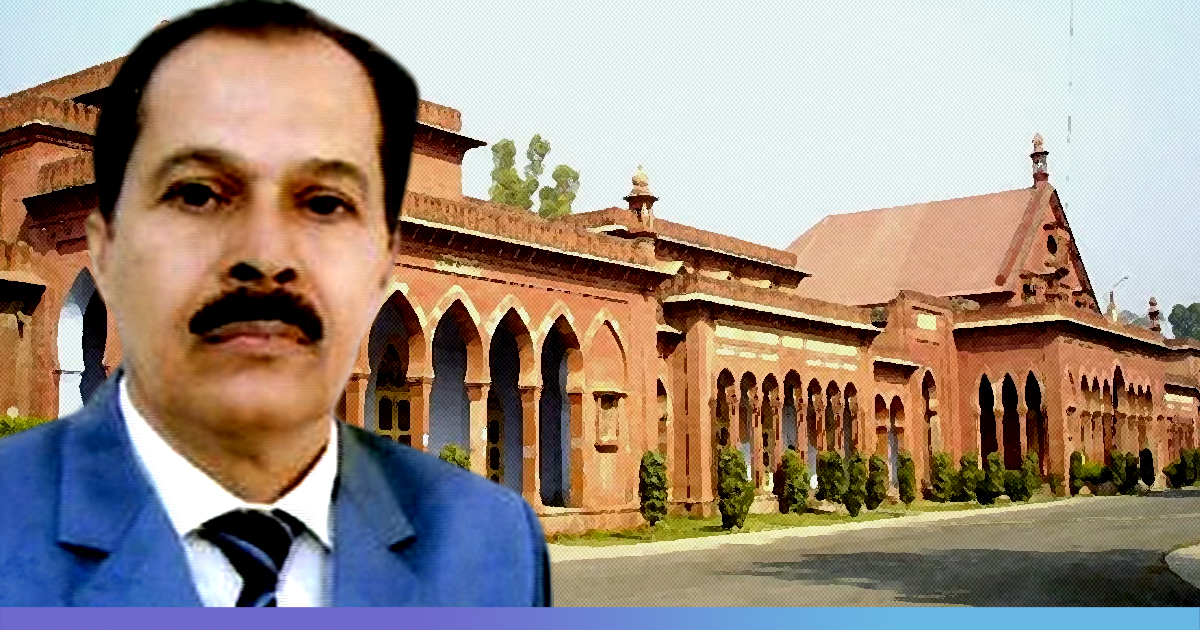A well-modulated voice picked up the phone with an uncustomary salutation which could be considered the opposite of the word I chose to use as a greeting.
Instead of a “Hello”, our conversation started with him receiving my call with a reflexive ‘namaste’, and I, with a conditioned ‘salaam’.
The individual on the other side of the line was Professor Mohammed Sharif, Chairman and Head of Aligarh Muslim University’s Sanskrit Department.
“Ours is an ancient department. We began functions in 1875 and are thriving till date”, he said in a voice beaming with pride.
‘A student of Sanskrit’ is the epithet he likes to go by as he claims to be always learning. He has been working in Aligarh Muslim University’s Sanskrit department for over 26 years and strongly proclaims that his university is entirely free of any form of discrimination or prejudice. “The culture of AMU is truly representative of the culture of India. Extraordinarily pluralistic and diverse”, he smiled.
The 54-year-old is one of India’s first ‘Muslim’ Doctor of Letters (D.Litt) in Sanskrit and has completed all of his education in Uttar Pradesh. A graduate from the University of Allahabad, he also finished his D.Litt thesis in the same varsity.

Specialised in Sanskrit Literature and Indian Philosophy, Prof Sharif’s PhD thesis was titled ‘Nal Damayanti Katha Ka Sameckshatmak Adhyyana’ – which is a critical analysis of the story of Nal and Damayanti in Mahabharata where the themes of love, deceit and war between Lord Indra and Raja Nal are explored.
“Mujhe bas Hinduon se pyaar aur aashirvaad mila hai” (I have received only love and blessings from Hindus)”, he added as he explained his advent into the study of Sanskrit.
As a small-town boy in Sultanpur, Uttar Pradesh, Mohammed Sharif fell in love with the language during his school days. He completed his higher secondary education with Sanskrit as one of his primary subjects and went on to pursue a Bachelor of Arts in Sanskrit, Philosophy and Urdu.
When asked whether he faced any resistance from his family due to his academic choices, he proudly stated that his parents supported every decision of his with all their heart. “I only had to endure some taunts by members of my extended family. Those people who compartmentalise the arts, which is an expression of life, will never be able to see beyond their narrow understanding of religion”, he said.
But, what is religion to him? And how did he go on to choose a career path so unconventional for a Muslim?
“We tend to associate certain languages and cultural appearances with specific identities and the languages become a taboo if you’re indoctrinated by your societal position. But, I never made those correlations. Saare dharm apni apni jagah par theek hai.”
As he was imparting wisdom on how religious beliefs and personal interests don’t need to be mutually exclusive – how it should not be necessary to choose between this and that – he quoted the 47th verse of the 2nd chapter from the Bhagavad Gita,
“कर्मण्येवाधिकारस्ते
मा फलेषु कदाचन।
मा कर्मफलहेतुर्भुर्मा
ते संगोऽस्त्वकर्मणि॥४७॥”
(Your duty is in actions alone and not in their results. Results of action should not be your motive and you should not get attached to inaction either)
My untrained and unaware ears didn’t catch a word of what the Muslim professor of Sanskrit had recited in context to the chat we were having. I requested him to repeat himself and he told me to look up the 47th verse of the 2nd chapter.
Uninterested in religion, as most of my millennial friends, I had never found myself conversing about the holy book of Gita with anyone, let alone a Muslim professor – who was breaking down the philosophical thought behind those words for me.
“Karma karna humare upar hai. Uska phal kya milega ya nateeja kya hoga yeh Bhagwan aur Allah tai karenge.” (It is our job to do our duty, the result is not to be fretted over as the Almighty will look after that)
It was pleasantly surprising to hear him use the Vedic and Islamic term for ‘the Almighty’ in the same breath, as it is not commonplace to hear followers (of any religion) hold the other synonym in the same regard as the one they use for their religious practices.

However, Mohammed Sharif is a different man.
Blushing over how he is constantly in high demand by PhD scholars in his department, he said, “Mere office ke bahar PhD students ki ek lambi line aksar rehti hai, jo mujhe unka research guide banana chahte hai.” (There always is a long line of PhD students outside my office, who wish for me to be their research guide)
The constitution of students in his department is unlike that of the rest of the university. He approximates the percentage of Muslim students to 20, out of 100 – as opposed to the university’s Muslim predominance.
In his classes, he also teaches the dead language of Pali, Ramayana and Mahabharata, Yog, and Vedanta.
An hour passed and what was supposed to be an interview metamorphosed into a dialogue between a guru of eminence in Sanskrit and a shishya devoid of any knowledge in the subject.
We were coming close to the end of our chat, when I asked him how he manages to practice Islam while being an ardent ‘student’ of the religion derived from paganism and fire-worship.
With an audible yet slight chuckle, he softly said: “I read the Bhagavad Gita in the morning and fall asleep to the hymns of the Qur’an at night. Such is my faith and such is my life.”
Also Read: Qualified Acharya, PhD In Sanskrit Scriptures; Only Aspect ‘Disqualifying’ Firoz Khan Is Religion











